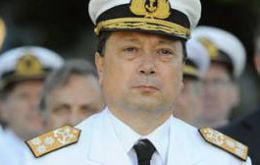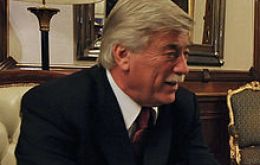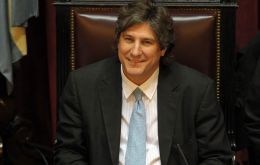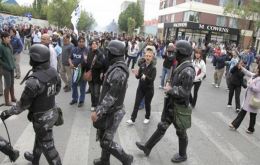MercoPress. South Atlantic News Agency
Tag: Cristina Fernandez
-
Wednesday, January 4th 2012 - 18:21 UTC
Cristina Fernandez confirms top commanders but purges 36 military brass

Hours before undergoing surgery Argentine President Cristina Fernandez purged 36 members of the military brass in the wake of the recent dismissal of the Navy commander amid a domestic-spying scandal.
-
Wednesday, January 4th 2012 - 06:18 UTC
CFK undergoes thyroid surgery; well-wishers camp next to hospital

Argentine president Cristina Fernandez on Tuesday rested at home on the eve of scheduled surgery for thyroid cancer, less than three months after being re-elected in a landslide.
-
Tuesday, January 3rd 2012 - 02:56 UTC
Cristina Fernandez returns to Buenos Aires ahead of Wednesday’s surgery

After spending New Year’s Eve with her family, Argentine President Cristina Fernández returned to Buenos Aires Monday midday from El Calafate, Santa Cruz province, less than 48 hours before she undergoes surgery for a thyroid gland carcinoma.
-
Monday, January 2nd 2012 - 20:51 UTC
Cristina Fernandez confirms full support for new governor of Rio Negro

A senior lawmaker from the ruling coalition of Argentine President Cristina Kirchner said that the Peronist party in the province of Rio Negro “would stand by” Vice-Governor Alberto Weretilneck, scheduled to take office as provincial governor on Tuesday due to the death of former governor Carlos Soria.
-
Monday, January 2nd 2012 - 00:40 UTC
Argentine Patagonian province governor killed in New Year in ‘strange’ incident

The Governor of the Argentine Patagonian province of Rio Negro died in the early morning of the first day of 2012 after having allegedly received two shots in the face. Governor Carlos Soria, an ally of President Cristina Fernandez had ended last October 28 years of opposition dominance of his province.
-
Friday, December 30th 2011 - 21:55 UTC
Cristina Fernandez in Patagonia for New Year; Wednesday surgery

Argentine President Cristina Fernández left on Friday for Santa Cruz province to her home in El Calafate to spend the New Year celebrations with her son Máximo, daughter Florencia and other family members. Next Wednesday she is scheduled to undergo thyroid cancer surgery.
-
Friday, December 30th 2011 - 06:17 UTC
Organized labour relations with President Cristina Fernandez are ‘all suspended’

“There are no contacts at all of any kind with the government, they have been all suspended” said on Thursday the Deputy Secretary of the Argentine powerful teamsters union Pablo Moyano when asked about current relations between organized labour and the administration of President Cristina Fernandez.
-
Friday, December 30th 2011 - 06:07 UTC
Riots and institutional crisis in Cristina Fernandez Santa Cruz province

Argentine President Cristina Fernández had to postpone on Thursday plans to fly to Santa Cruz where she is planning to spend New Year’s Eve with her son and daughter, following an institutional crisis and street rioting that left at least 23 injured and the resignation of several top posts in the provincial administration.
-
Thursday, December 29th 2011 - 21:24 UTC
Falklands’ flagged vessels: “Another diplomatic victory for President Fernández”

In its latest article on Argentina The Economist refers to the recent Mercosur decision to support President Cristina Fernandez in barring vessels flying the Falklands’ flag from docking in regional ports.
The magazine as the heading says (Argentina and the Falklands: rocking the boat) describes it as another diplomatic victory for Cristina and also argues that both the Falkland Islands and Britain have failed to explain their case to the rest of South America. -
Wednesday, December 28th 2011 - 22:45 UTC
Cristina Fernandez promulgates tough laws to control the media and social protest

Argentine president Cristina Fernandez has promulgated several bills, some of them considered controversial, sanctioned last week by Congress --where the ruling coalition has a comfortable working majority-- and which were published Wednesday in the Official Gazette.
